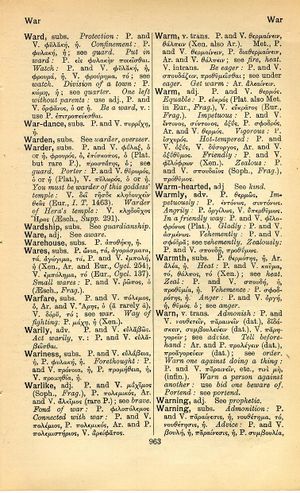warm: Difference between revisions
Τὸ νικᾶν αὐτὸν αὑτὸν πασῶν νικῶν πρώτη τε καὶ ἀρίστη. Τὸ δὲ ἡττᾶσθαι αὐτὸν ὑφ' ἑαυτοῦ πάντων αἴσχιστόν τε ἅμα καὶ κάκιστον. → Τo conquer yourself is the first and best victory of all, while to be conquered by yourself is of all the most shameful as well as evil
m (Text replacement - "<b class="b2">Frag.</b>" to "''Frag.''") |
(de4_5) |
||
| Line 25: | Line 25: | ||
<b class="b2">Zealous</b>: P. and V. [[σπουδαῖος]] (Soph., ''Frag.''), [[πρόθυμος]]. | <b class="b2">Zealous</b>: P. and V. [[σπουδαῖος]] (Soph., ''Frag.''), [[πρόθυμος]]. | ||
}} | |||
{{GermanLatin | |||
|dela=warm, [[calidus]]. – [[tepidus]] ([[lauwarm]]). – [[fervidus]] ([[sehr]] [[warm]], siedend [[heiß]]). – [[spissus]] ([[dicht]] u. [[daher]] [[warm]] haltend, [[von]] Kleidern). – [[intimus]] (bildl., [[innig]], [[wie]] [[Freund]], [[Freundschaft]]). – w. [[Wasser]], [[calida]] [[aqua]]; [[auch]] bl. [[calida]]: [[ein]] w. [[Umschlag]], [[fomentum]]. – [[ein]] w. [[Verehrer]] jmds., alcis studiosissimus: [[mit]] w. [[Zuneigung]], [[amanter]]. – [[warm]] [[sein]], calere; [[calidum]] [[esse]]: es ist [[warm]] ([[von]] der Witterung), calet aër: der [[Kopf]] ist mix [[schon]] w. [[genug]] (bildl.), [[iam]] [[caleo]]. – w. [[werden]], calescere; calefieri ([[auch]] v. Tieren, z.B. v. einem Pferde); incalescere (z.B. anni [[tempus]] incalescit: u. vino [[incalesco]]). – w. [[machen]], calefacere (eig.; u. bildl. = [[einer]] [[Person]] [[tüchtig]] [[zusetzen]] ); exercere (bildl., eine [[Person]], [[ihr]] [[tüchtig]] [[zusetzen]]): jmdm. den [[Kopf]] [[mit]] [[etwas]] w. [[machen]], alqm fatigare alqā re (z.B. precibus). | |||
}} | }} | ||
Revision as of 09:41, 15 August 2017
English > Greek (Woodhouse)
v. trans.
P. and V. θερμαίνειν, θάλπειν (Xen. also Ar.).
Met., P. and V. θερμαίνειν, P. διαθερμαίνειν, Ar. and V. θάλπειν; see fire, heat.
V. intrans. Be eager: P. and V. σπουδάζειν, προθυμεῖσθαι; see under eager.
Get warm: Ar. ἀλεαίνειν.
adj.
P. and V. θερμός.
Equable: P. εὐκράς (Plat. also Met. in Eur., Frag.), V. εὔκρατος (Eur., Frag.).
Impetuous: P. and V. ἔντονος, σύντονος, ὀξύς, P. σφοδρός, Ar. and V. θερμός.
Vigorous: P. ἰσχυρός.
Hot-tempered: P. and V. ὀξύς, V. δύσοργος, Ar. and V. ὀξύθυμος.
Friendly: P. and V. φιλόφρων (Xen.).
Zealous: P. and V. σπουδαῖος (Soph., Frag.), πρόθυμος.
German > Latin
warm, calidus. – tepidus (lauwarm). – fervidus (sehr warm, siedend heiß). – spissus (dicht u. daher warm haltend, von Kleidern). – intimus (bildl., innig, wie Freund, Freundschaft). – w. Wasser, calida aqua; auch bl. calida: ein w. Umschlag, fomentum. – ein w. Verehrer jmds., alcis studiosissimus: mit w. Zuneigung, amanter. – warm sein, calere; calidum esse: es ist warm (von der Witterung), calet aër: der Kopf ist mix schon w. genug (bildl.), iam caleo. – w. werden, calescere; calefieri (auch v. Tieren, z.B. v. einem Pferde); incalescere (z.B. anni tempus incalescit: u. vino incalesco). – w. machen, calefacere (eig.; u. bildl. = einer Person tüchtig zusetzen ); exercere (bildl., eine Person, ihr tüchtig zusetzen): jmdm. den Kopf mit etwas w. machen, alqm fatigare alqā re (z.B. precibus).

